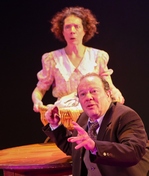A CurtainUp Review
Death of a Salesman in Yiddish
|
Men darf achtung geben! (Attention must be paid!) —Linda Loman |

Avi Hoffman as Willy Loman and Suzanne Toren as Linda Loman (Photo: Ronald L. Glassman)
|
The production is directed by Moshe Yassur and stars Avi Hoffman as Willy Loman with Suzanne Toren as Linda. Although New Yiddish Rep uses the Joseph Buloff translation, they have further adapted the play by inserting English into the script, mostly at times when the Lomans are interacting with non-Jews in the larger "American" world. Thus the play becomes more about the dangers of assimilation than the failure of the American Dream.
This translation also reveals just how hard Miller worked to make the Lomans as gentile as possible. Willy, unlike most Jewish fathers of his generation, is much more interested in sports than scholarship. Although Jewish men are notoriously unskilled with a hammer and nails, Willy knows how to put up a roof and build a garage. He also enjoys gardening, not exactly a favorite occupation of Jewish men.
Biff, who can't seem to settle down, likes the out-of-doors and fooling around with horses. Happy is able to keep a job but he can't seem to settle on one woman. Linda is so protective of her husband she asks her sons to stay away from her home if they can't refrain from arguing with their father. Really? What Jewish mother would make such a request?
If Miller made the family clearly not Jewish, he didn't make them definitely anything else. They don't go to church or celebrate any holidays. They seem to have no goals other than making money and friends.This may be the America Miller writes about, but it is certainly not the America he encountered growing up in Brooklyn.
If the rootlessness of the Lomans is not apparent in traditional productions, it certainly becomes blatantly obvious when the family becomes Jewish and speaks Yiddish (English supertitles are projected on two screens set at an angle to represent the walls of the Loman kitchen).
The play has other delights.
Hoffman, whose best-known shows include Too Jewish and Too Jewish Too, surely comes into his own as Willy. He is perfect as the small Jewish man with big dreams— a man who loves his wife but can't keep away from temptation, who wants to raise successful children but has lost touch with the values that will give them inner strength. His scenes with Linda and his betrayal of her are particularly heartrending, partly due to the natural poignancy of the Yiddish language, but also thanks in great part to his tremendous acting.
Toren gives Linda an urgency she doesn't always have. This is a woman who knows what she wants. In her quiet, insistent way, she's the real backbone of the family. Daniel Kahn (Biff) and Lev Herskovitz (Happy) are most effective in their scenes with each other when sibling rivalry and affection mix dramatically.
Perhaps the two characters who do represent traditional Jews best are Charley (Shane Baker) and his son Bernard (Ben Rosenblatt). Although Rosenblatt makes the bookish Bernard a bit too stereotypically nerdy, he certainly hits the mark when Bernard becomes a dignified and ethical adult. Baker knows how to make the good-natured Charley sympathetic but not too saintly.
Finally, Mark Marcante's simple set (a table and chairs with a painted background of a city) perfectly conveys the tiny, confined world in which the Lomans live. Gertjan Houben has supplied the impressionistic lighting and Ellen Mandel and Michael Winograd the mood music that does so much to enhance the memory scenes.
Last season, New Yiddish Rep produced a Yiddish version of Waiting for Godot that made the play live in surprising new ways. After seeing this version of Death of a Salesman, it's not hard to speculate on how much better even this great classic might have been if Miller had been more in touch with his roots.
|
Death of a Salesman By Arthur Miller Directed by Moshe Yassur Cast: Avi Hoffman (Willy Loman); Daniel Kahn (Biff); Suzanne Toren (Linda); Lev Herskovitz (Happy); Itzy Firestone (Uncle Ben); Adam Shapiro (Howard); Arielle Beth (Letta), Amy Coleman (the Woman), Shaya Schmidt (Miss Forsythe), Ilan Kwittken (Stanley the waiter) Scenic Design: Mark Marcante Lighting Design: Gertjan Houben Costume Design: Gina Healy Sound Design & Original Music: Ellen Mandel Clarinet Music Composer: Michael Winograd Production Stage Manager: Mark Brystowski Running Time: 2 hours and 20 minutes, with one intermission The Castillo Theatre, 453 West 42 Street, www.castillo.org or (866) 811-4111 From 10/08/15; closing 11/22/15 Wednesday, Thursday, Friday at 7pm, Saturday at 2pm and 7pm and Sunday at 2pm. No performance on Wed/Thurs Nov. 4 and 5 Tickets: $50 Reviewed by Paulanne Simmons Oct. 18, 2015 |
|
REVIEW FEEDBACK Highlight one of the responses below and click "copy" or"CTRL+C"
Paste the highlighted text into the subject line (CTRL+ V): Feel free to add detailed comments in the body of the email. . .also the names and emails of any friends to whom you'd like us to forward a copy of this review. For a feed to reviews and features as they are posted add http://curtainupnewlinks.blogspot.com to your reader Curtainup at Facebook . . . Curtainup at Twitter Subscribe to our FREE email updates: E-mail: esommer@curtainup.comesommer@curtainup.com put SUBSCRIBE CURTAINUP EMAIL UPDATE in the subject line and your full name and email address in the body of the message. If you can spare a minute, tell us how you came to CurtainUp and from what part of the country. |


 Book of Mormon -CD
Book of Mormon -CD